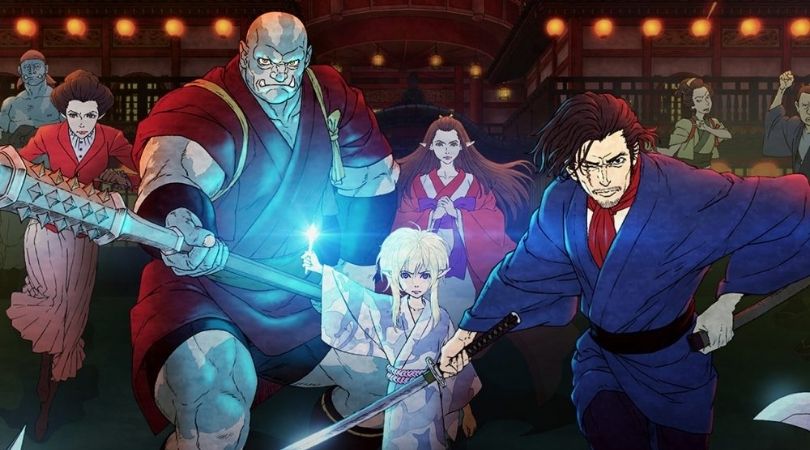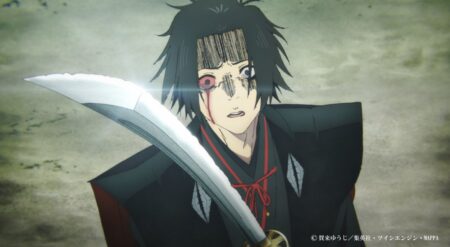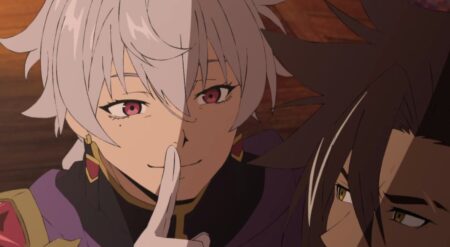
Bright: Samurai Soul is a Netflix Anime Film written by Michiko Yokote and directed by Kyohei Ishiguro. At the beginning of the Meiji Restoration, former samurai Izou (Simu Liu) now works as a bodyguard in Kyoto’s most popular brothel. Izou is charged with looking after an elf girl named Sonya (Yuzu Harada), who has possession of a magic wand that was used during the Sengoku period. Together with Orc bandit turned companion Raiden (Fred Mancuso), Izou intends to take Sonya and the wand to the land of Northern Elves, all the while dealing with malevolent forces and the ghosts of his past.
When Samurai Soul was first announced, it was met with confusion and/or outright disdain. The original Bright didn’t exactly receive a warm reception, with criticism focused on its refusal to expand on a genuinely interesting pitch where humanity and mythical creatures lived side by side. Yet, it apparently became one of Netflix’s most-watched original films, which led to a sequel. Thankfully, Samurai Soul is more than willing to explore how the Meiji Restoration would work if orcs and goblins walked among humankind.
A bandit that attacks the film’s heroes replaces a lost limb with a writhing mass of tentacles, which can hold on to his various rifles. A centaur takes Izou and Raiden into his home and reveals the conflict that drives the film’s second half. Even the wands turn out to have significance: those who have a “bright” aura will lead the world into a new golden age, while those with a “dark” aura will tip it into ruin.
Yet, for all its expansion upon the original film, Bright: Samurai Soul ultimately tells the same story as the film it was based on. This feels like a majorly missed opportunity on Ishiguro and Yokote’s part—they could have taken its general concept and gone in an entirely different direction. Star Wars: Visions was able to filter the Star Wars universe through various anime studios and genres, and Yasuke injected the legend of the first Black samurai with magic and mecha. The one thing I can take comfort in is that Max Landis, who was revealed to be a serial abuser in the wake of the original film’s release, isn’t involved with this project in any way. Hopefully, this extends to any residuals as well.
That same hit-and-miss feeling is present in the animation, which is handled by animation studio ARECT. Mixing 3D animation with the aesthetic of Japanese woodblock art, the film soars in its battle sequences as opponents are dispatched via Izou’s katana and Raiden’s war club. And they are dispatched rather gorily; a fair amount of blood is shed in this film, and multiple limbs are sent flying. Yet up close, the film’s characters feel oddly stiff and their mouths lag behind the dialogue. It was admittedly jarring to me; hopefully, ARECT smooths out the process in their future projects.
The one constant in the film is the voice performances, particularly Liu and Mancuso’s. This is Liu’s second high-profile project this year following Shang-Chi and the Legend of the Ten Rings. He slowly peels away the layers of Izou’s past, revealing a warrior searching for a purpose and finding it in the makeshift family he forges with Raiden and Sonya. Mancuso plays Raiden as a surprisingly soft-spoken being who yearns for redemption. Raiden even breaks his own fang as a symbol of loyalty to Izou. Compared to Will Smith and Joel Edgerton’s lack of chemistry in the original Bright, I actually buy Izou and Raiden as battle-hardened allies.
Bright: Samurai Soul may walk the same ground as the movie it’s based on, but it’s willing to explore its concept and how the setting would work in feudal Japan. If you’re looking for a Saturday afternoon watch or have enjoyed Netflix’s library of original anime titles, this may be up your alley.
Bright: Samurai Soul is currently available to stream on Netflix.
Bright: Samurai Soul
-
Rating - 6/106/10
TL;DR
Bright: Samurai Soul may walk the same ground as the movie it’s based on, but it’s willing to explore its concept and how the setting would work in feudal Japan. If you’re looking for a Saturday afternoon watch or have enjoyed Netflix’s library of original anime titles, this may be up your alley.






